by Brian Hioe
語言:
English /// 中文
Photo credit: 陳又新 港湖日新又新/Facebook
Translator: Brian Hioe
On September 28th, New Bloom editor Brian Hioe interviewed Chen You-xin of the Social Democratic Party, who is running in the Neihu-Nangang area of Taipei. This is part of New Bloom’s ongoing series of interviews with independent city councilor candidates, as part of its special 2018 election coverage.
Brian Hioe: Can you first introduce yourself for readers who may not know you?
Chen You-xin: I am Chen You-xin, I am a lawyer. Currently, I am running for office in the Neihu-Nangang district in Taipei. In the past ten years, I have worked as a lawyer, which was for the most part in a regular law firm. But because I also majored in social work in college, as a lawyer, I also worked closely with social welfare organizations, such as in providing assistance, training, or social work, help with regards to legal questions, basically helping out by using my position as a lawyer.
This was primarily with women’s and LGBTQ associations. But while the first six years of my career were in other people’s offices, the last four years, I have been self-employed. Becoming self-employed allowed me to have more time to participate in work around social issues, such as in regards to labor rights, laid off toll collectors, or the development of the city in Neihu, with different protest events, like opposition to nuclear energy, and etc. I also helped out as a lawyer in these cases.
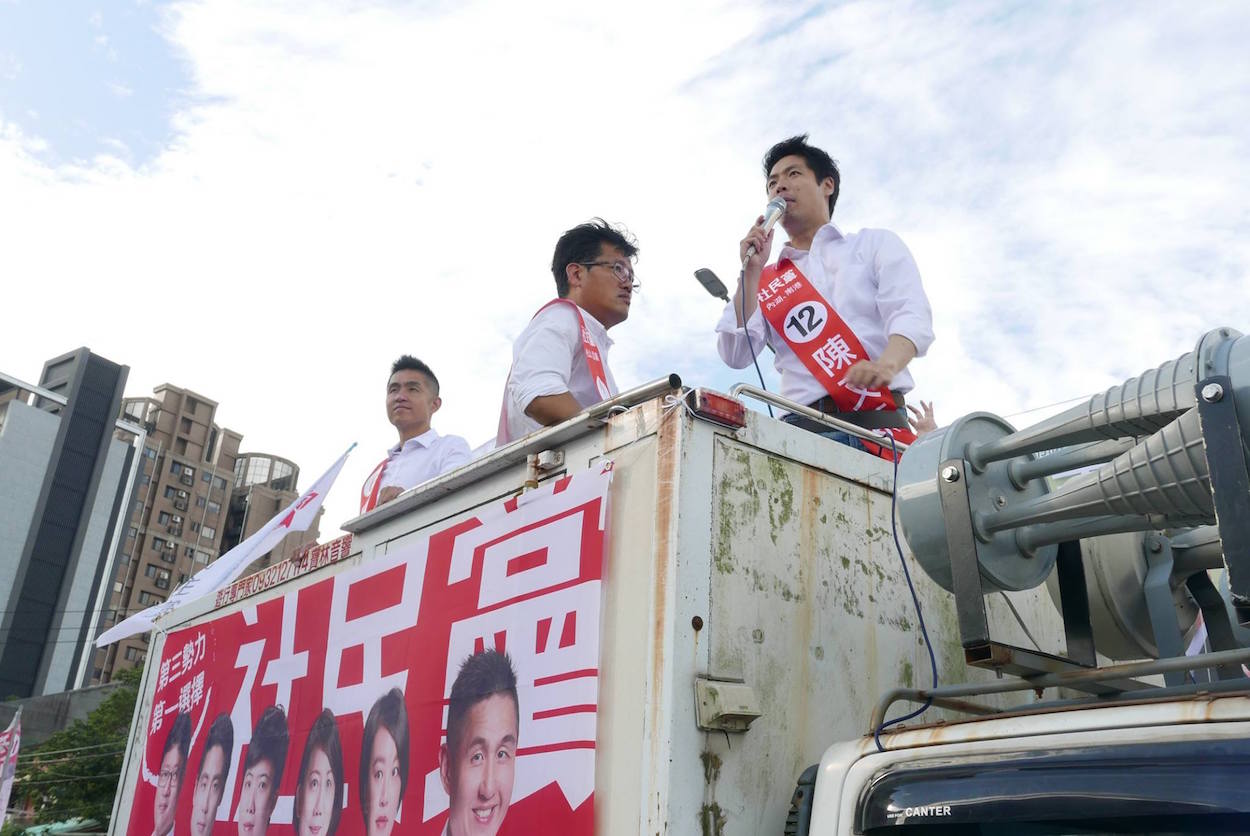 Photo credit: 陳又新 港湖日新又新/Facebook
Photo credit: 陳又新 港湖日新又新/Facebook
BH: Why would you decide to run for office? As you mentioned, you primarily participated in social movements in the past, as a lawyer.
CY: Yes. You could say that it began in 2016 because after the formation of the SDP in 2016 and its participation in 2016 legislative elections, I was helping out the party doing some work for the elections. As I mentioned, I also majored in social work in college. Furthermore, because my values tend to slant towards the political left, I believe that that people are born with inequalities and some inequalities originate from society, such as some people may be taller, others may be shorter, or someone may be born missing a limb, and so people have different circumstances. However, the work of the government should be to try and establish equality and pull people to be closer together.
The Social Democratic Party is a party that can try to push for these values, which is why I would support this party. In 2016 elections, the SDP did not have a good result, and so the 2018 elections is a very crucial time for the SDP, to see if the party will be able to sustain itself.
I personally believe that the SDP is very necessary for Taiwan, and that if there is no party like the SDP, Taiwan will be caught in the same political circumstances of the last ten years, in which no matter what you choose—apart from some minor differences—the policies of these parties are all the same. This is with regards to welfare, the economy, or other aspects, which will be caught in right-wing capitalism or neoliberalism. Such as in regards cutting taxes for the benefit of corporations,it is believed that with a certain level of social development, the wealthy, their profit will trickle down to the rest of society, such as with workers.
This led me to be disappointed and hope for change, pushing me toward the values of the Social Democratic Party. Because I believe that the SDP is necessary for Taiwan, I decided to run.
BH: What is particular about this area you are running in?
CY: This area is actually where I grew up. I’ve lived in Neihu since I was small. A particular characteristic of Neihu is that its geography is divided, such as by the river. Neihu and Nangang also share the particularity of that they were two areas that were late in becoming part of Taipei. Half of Nangang also primarily consists of mountains. It is a very good natural environment and I think the area is very suitable for living because there are mountains, lakes, parks, land, and other elements.
With regards to its development, it was first because of the plan to put the software park here that many software engineers were put in the Nangang area. The prices for real estate are high in the east, because the high-speed rail, TRA, and other facilities are by the Nangang train station. And so, although the natural environment is very good here, the development of industry is also not bad. To draw a comparison, my mother is from Yilan, and while efforts for nature conservation there have drawn much attention in the past ten years, it is weaker in terms of the development of industry. I think it is quite special that Nangang has this nature and I believe that it is valued by local residents and that it is also good there is industry, which is the special characteristic of Neiju and Nangang.
However, like I said, with regards to what is underdeveloped, if you open up a map, you will discover that the area has another feature, which is that there is just one main road. If you look at the MRT line, you can see that the population is all around this road in Neihu. This is also true of Nangang, in which there are two roads leading up to Academia Road from Zhongxiao East Road and Nangang Road. This is not like the spread out development of other areas in Taipei.
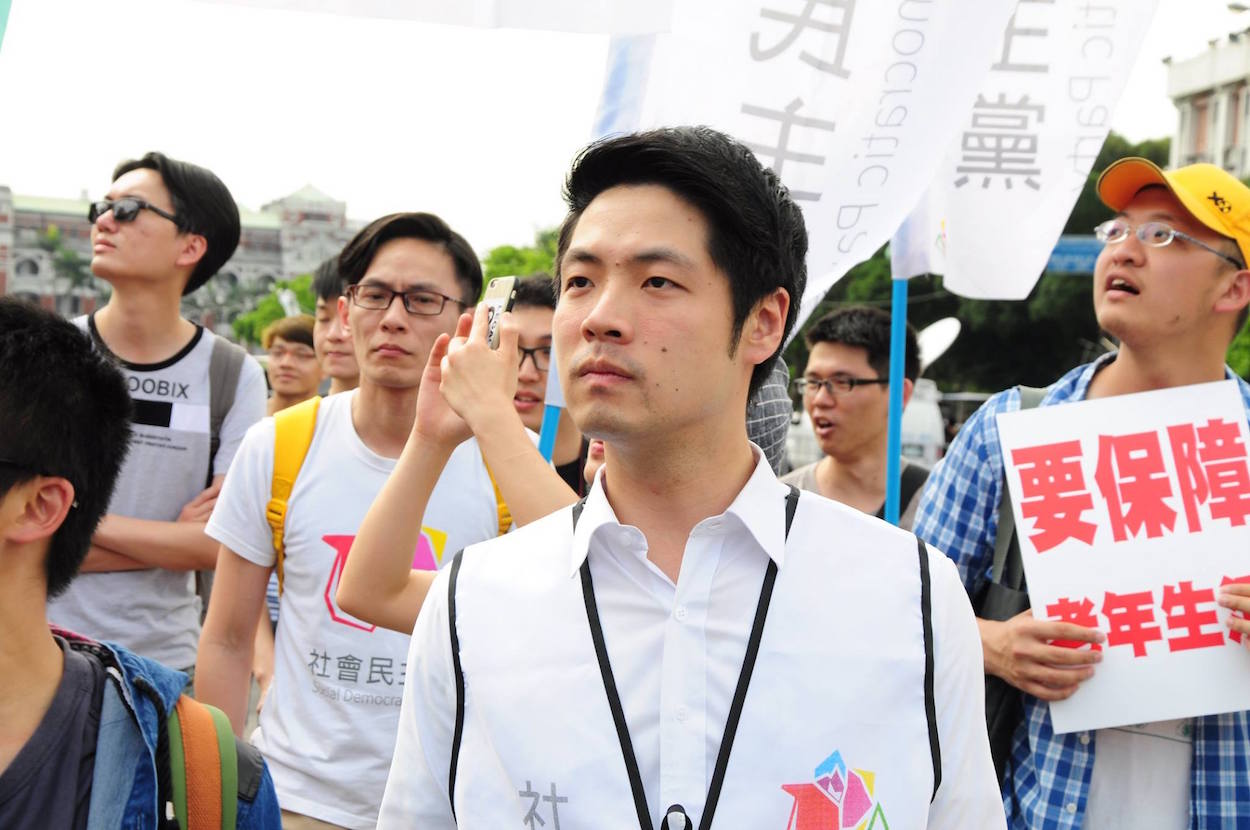 Photo credit: 陳又新 港湖日新又新/Facebook
Photo credit: 陳又新 港湖日新又新/Facebook
This leads to a greater distance between Nangang and the city, as well as weaker integration with other districts. We confront a very large problem with traffic here, with urban planning to put 150,000 jobs at the Nangang Software Park here. After this was put here, traffic has become increasingly unable to accommodate 150,000 people. So with a region that is further from the city, in terms of trying to develop it because so much of the area is mountainous, it’s a really limited situation. With these limitations, this is an issue we must work through.
BH: Who are your opponents in this area? What kind of election strategy will you adopt?
CY: Because more than one seat can be voted in for city council, in this area, there are nine seats. But there are no direct enemies per se in the way there would be in running for legislator, lizhang, or mayor.
From the beginning, I did not pay much notice to the others are running, such as looking at the things they do better than us. We need to find maybe 100,000, 150,000, and 200,000 voters to allow us to surpass the limit to be voted in. In order to reach this sort of goal, we will analyze past results, looking at who may support the SDP, as well as if there are people who are groups that we can try to win the support of. This is our main strategy.
After finding who may come to support us, we will try to figure out how we can meet these people. I am more proud of this. In the past, the SDP was criticized for not being grounded in a local area, and for mostly existing on the Internet or primarily having the support of a small group of young people. But this led to results which we did not expect. So this taught us that we shouldn’t set limits on the activities we carry out to try to meet voters. There are different means of meeting different voters. With young people below thirty, you may rely more on the Internet, such as with Facebook, PTT, DCard, or other mediums. The groups you meet on these platforms is also different.
What about those above age 40? Would we give up on them? According to our analysis, we also have a market among this demographic, although we may have neglected it in the past. For example, in attending activities organized by lizhang, neighborhood activities, or ones in temples, we may encounter this demographic. Writing political commentary online may not help in encountering these groups, but you may encounter them by walking around a local area, which allows us to meet different groups—not just young people. So one needs to try many means of outreach. We began these efforts early on in this area.
In September of this year, after we launched our campaign headquarters, of the 50 to 60 li in the area, 12 lizhang came to express their support. Some, who were unable to attend sent flowers. This is evidence that perhaps 1/4 of the local lizhang support us—looking at the fact that that they chose to attend our campaign office launch.
This sort of support would be hard to imagine for us in the past. In the past, we were a bit weaker with regards to activities like standing on the side of a road, but we have spent much energy on this. Although some may view this as an old, traditional form of politics, you need different ways of encountering voters. If you want to meet a fifty-five-year-old voter, then this maybe is less likely to happen on the internet. You may have to attend an activity organized by a lizhang, or something like that.
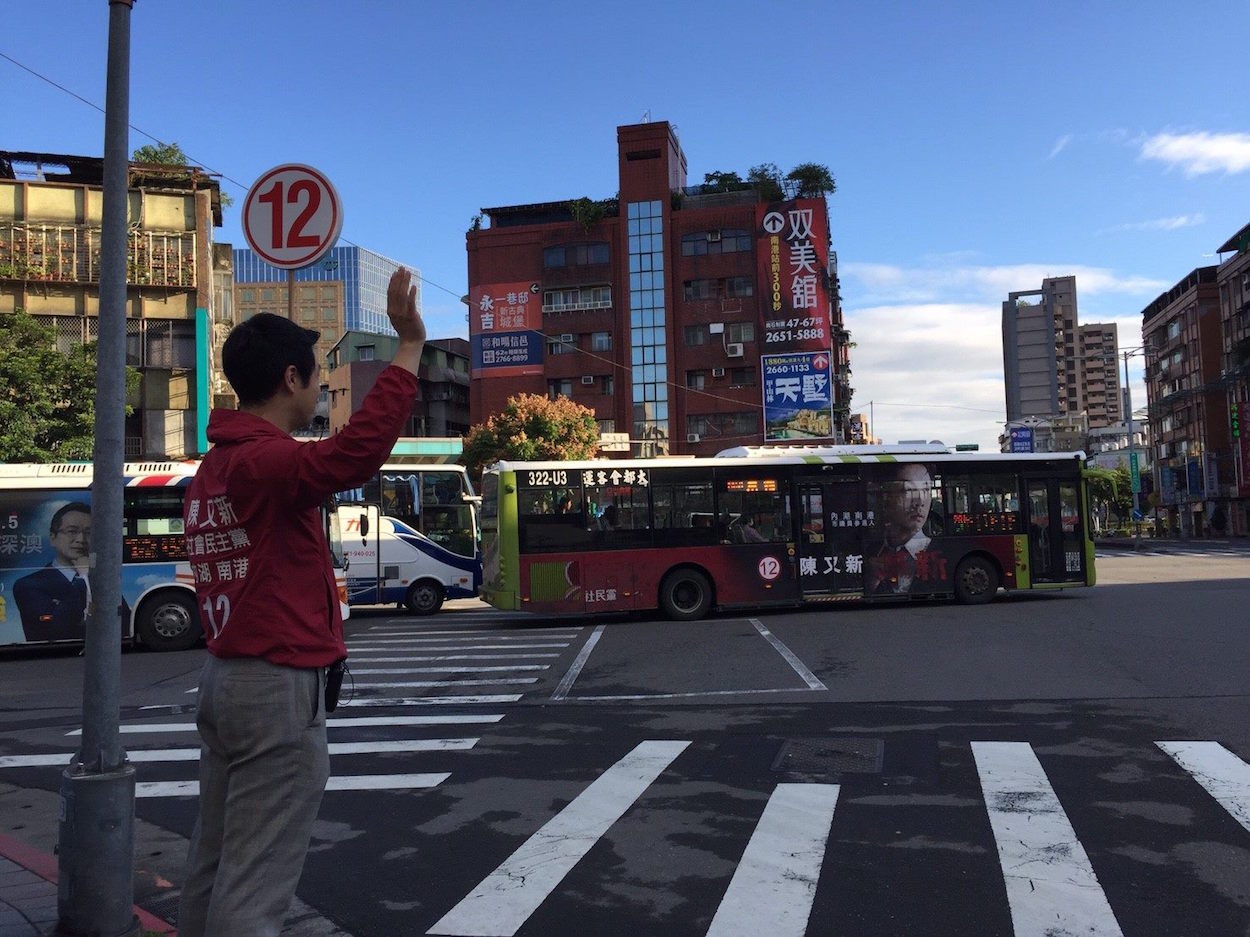 Photo credit: 陳又新 港湖日新又新/Facebook
Photo credit: 陳又新 港湖日新又新/Facebook
In terms of Third Force parties, there are fewer candidates who spend energy on strategies like campaigning on the street however, we are proud to say we’ve spend a lot of energy on this. Without this, we would have difficulty gaining the support of people like this, and we would be unable to demonstrate our ideals to them. We would have difficulty breaking out of our echo chamber if we relied only on the Internet and primarily only interact with young people. These ideals need to be changed—politicians need to expand our reach to more groups.
BH: What do you view as particular about yourself as a political candidate, as compared to other candidates?
CY: Me as a politician? [Laughs] I have to state, yes, in the SDP, there are many things we try, but I have the specificity of being a lawyer. You see that flag outside of my office? As a lawyer, I provide legal consultation. We began providing that last year, after building ties with lizhang, and seeing what kinds of services I could provide them with. Lizhangs can use us to provide their local residents with legal consultation in their offices.
This is using my area of specialty. For example, our convenor, Fan Yun, she often jokes, “What should I do? I’m a sociology professor. What kind of service could I provide?” As a lawyer, I can provide these services. Up to now, in over one year of campaigning, we have done 207 consultations, usually providing three or four sessions per week. This has provided aid to over 800 people.
In this district, there is another lawyer who is already a city councilor. He usually provides two sessions per week and he has done this for a very long time. His service has also been widely praised. We’re imitating this example, but we work even harder, and we do more than him, hoping to have results in a short amount of time.
In this area, there are many city councilors who have served for many terms and may be more traditional in how they do things. They may have good relations with certain local groups, representing the interests of these groups. But as a Third Force candidate, although I grew up in this area, we don’t have such networks, and we also don’t hope to develop such interests.
But in the Neihu-Nangang area, we hope to establish more relations. We do not have any grudges. I hope that people can come to know that Chen You-xin may be young, may be a Third Force candidate, and may not be traditional pan-green and pan-Blue, but can also come to represent the area. I believe I have worked harder on this aspect than traditional pan-Blue and pan-Green parties in the area.
BH: What kind of challenges do you have to overcome in your campaign?
CY: Actually, after I ran for office, I think that it is not just a question of local areas. The biggest challenge I face is like when—or example, I went to an event for the mid-autumn festival. I told many lizhang who I was to try and promote myself and usually said the same thing—that I had done over two hundred legal consultations to assist over 800 people, and written 45 political commentaries in various magazines. But I was still a stranger to everyone. [Laughs] I could see it in their eyes, they were wondering, “Who is this person?”
Which is to say, yes, there was simply another candidate out there named Chen You-xin, but two months before the election they were just hearing this name for the first time. Why would this be so? Was it that I hadn’t worked hard enough? That I hadn’t written enough political commentaries? I do not think I am worse than others, in terms of policy or other issues, yet despite our efforts, people still did not know about us?
 Photo credit: 陳又新 港湖日新又新/Facebook
Photo credit: 陳又新 港湖日新又新/Facebook
I think this is very practical. The biggest difficulty of political culture in Taiwan and election culture is that, despite the fact that candidates work very hard, it isn’t an issue of political analysis, research, or the services we provide. Usually, when candidates try and advertise themselves, they simply advertise their name and face and hope for voters to remember this. And in campaigning, this simply becomes a matter of competing in campaign spending.
This is where problems come from, in terms of elections. How to advertise yourself so that everyone will remember? Simply spend a lot of money? Buy banners? Provide a lot of campaign goods? Our traditional campaign goods are tissues, but you find people coming up with all sorts of things to get people to remember. I’ve even seen toothpicks. This is very creative, but it’s too much. What about your political views could you put on a toothpick?
This is even more so with billboards. Before I posted a joke on my Facebook page. Why not put out fifty billboards? If each one is 30,000 NT per month, 50 banners would be 1,500,000 NT. Let’s say I kept the banners up two months. Then it’s 3,000,000 NT. Wow!
But to be frank, if you walk around Neihu and Nangang, you will see a lot of banners for political candidates. But for a new politician and a new party, how could you spend so much? Isn’t this unreasonable?
Keeping it within reason, and using the most simple, bottom-line methods of advertising, I predict that for this election I will spend 2,000,000 NT. If I really wanted to spend that much on banners, that would be 5,000,000 NT. If I wanted to keep the banners up for two months, then it would be 6,000,000 NT. But a city councilor only makes 4,500,000 NT in four years. You could charge fees for appearances, but this doesn’t seem reasonable. How would you spend so much money on publicity and not discuss policy in the slightest?
I may be exaggerating a bit, but for most people, it really is just advertising your face and name. I think this returns to a very large issue, that there’s no way to change this political culture, with this focus on a face, name, and not on political views? But this is what everybody does.
I’m basically the same, I try hard, but reluctantly to put a QR code on my election goods so you can scan it and see what my political views are. [Laughs] Otherwise, nobody would be talking about policy. This is also not particular to my election district but is a broader issue with Taiwanese politics.
We don’t talk enough about policy, we instead let money cover this up. But I am hopeful in regards to this. For example, if you look at Japan, they don’t have election billboards every year. Voters only need to go to the bulletin at their neighborhood office to see who is running and everyone is the same on the bulletin board. So matters of recognizability are very simple and people are all made about equally recognizable. It doesn’t need to be that 100% or 99% of voters all recognize the incumbent city councillor, but only 30% recognize me and perhaps 70% of them won’t.
So I am working hard on raising my recognizability. But if I spent all my resources on billboards, this would just be competing on campaign spending, and I believe that this political culture is wrong. This is a very large challenge.
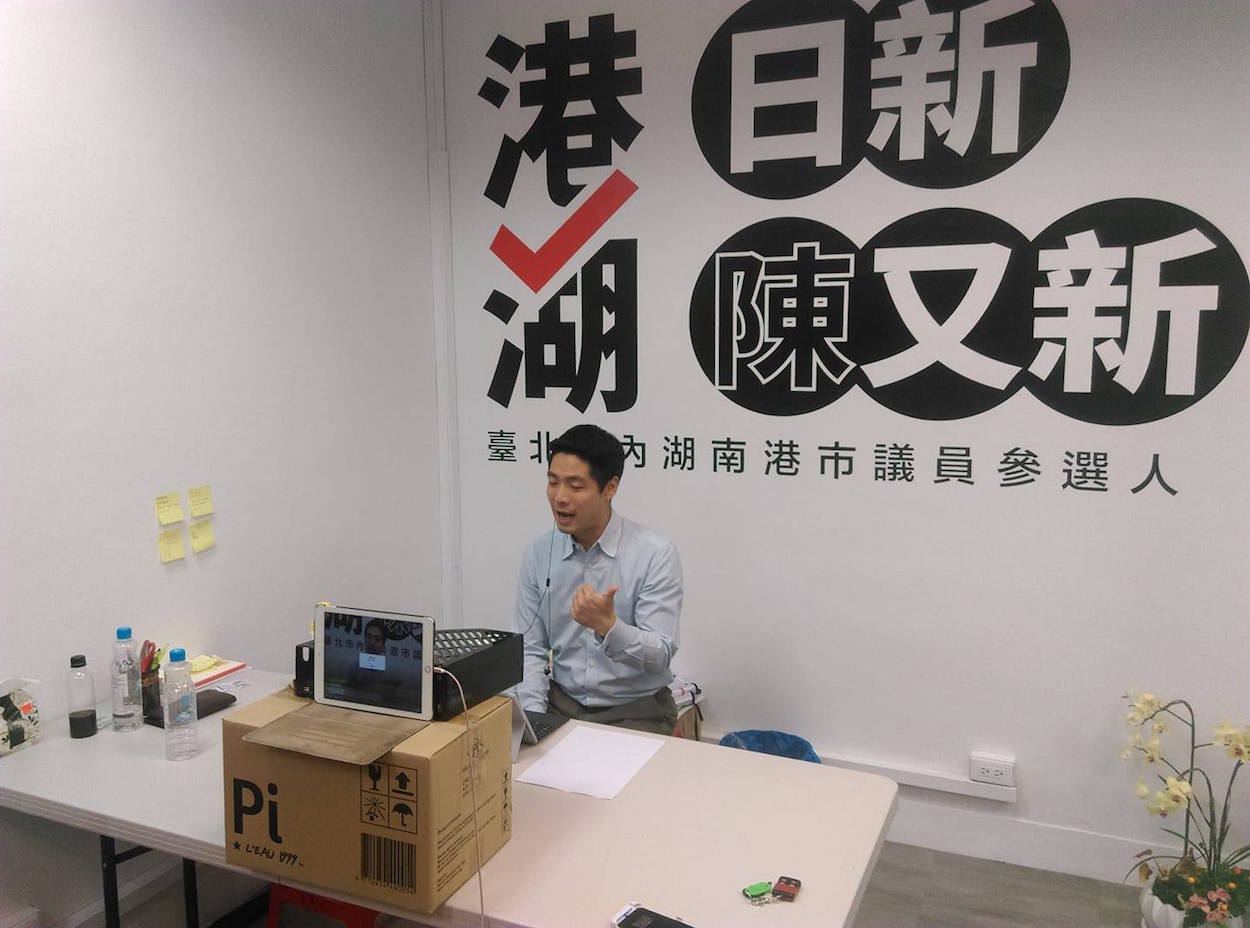 Photo credit: 陳又新 港湖日新又新/Facebook
Photo credit: 陳又新 港湖日新又新/Facebook
BH: The past few years in Taiwan have seen the emergence of the Third Force. Do you think that this is similar to what has taken place in other parts of the world? For example, with the emergence of other new political parties.
CY: I think that if you put it this way, that for some firmly established democratic countries, such as with America or Europe, they haven’t turned left. They may have existed, but now Europe has turned in the direction of extreme right, nationalist parties.
But of course, I do believe that you’ve seen some new tendencies in the last few years. This is people have seen that the current, capitalist system is broken under conditions of neoliberalism, in which it is believed that there should be a small government and capitalism should be left unregulated to develop freely on its own, and to allow the market to make decisions on its own and that this will lead to continuous growth. With this premise, it is predicted that laborers will benefit along with their employers and their salaries will naturally rise.
We can see that Taiwanese young people in these past few years often hear this kind of talk. This is the premise of capitalism. That bosses making more money will lead to an increase in salaries for you as well. These past decades you always hear people concerned about the growth of the GDP, but even if the GDP has nearly tripled in the past two decades, the regular salary has not.
This is a very clear error. I believe that once people realize, so long as they are logical, they will realize the failure of capitalism. I believe that capitalists keep all of the profits they make for themselves and that this is something we need to address, to prevent capitalists from continuing to do this. We need to force them to share their profits with workers, in order to aspire toward equality.
I believe this is reasonable. In looking at the American or European left, you will find that they have opposed capitalism for a very long time. With dissatisfaction, people will vote for a different group of people over time, with the hopes that they will address these unequal circumstances. But after society has become more equal, the people may hope that development speeds up, and so they may vote for right-wing capitalists and neoliberal policies again. [Laughs] I believe that for a firmly developed country, when certain policies no longer work, they can switch political directions, to allow for further improvements. In looking at international trends, we can see that socioeconomic equality is more and severe and that the system is broken, and so we need to change this.
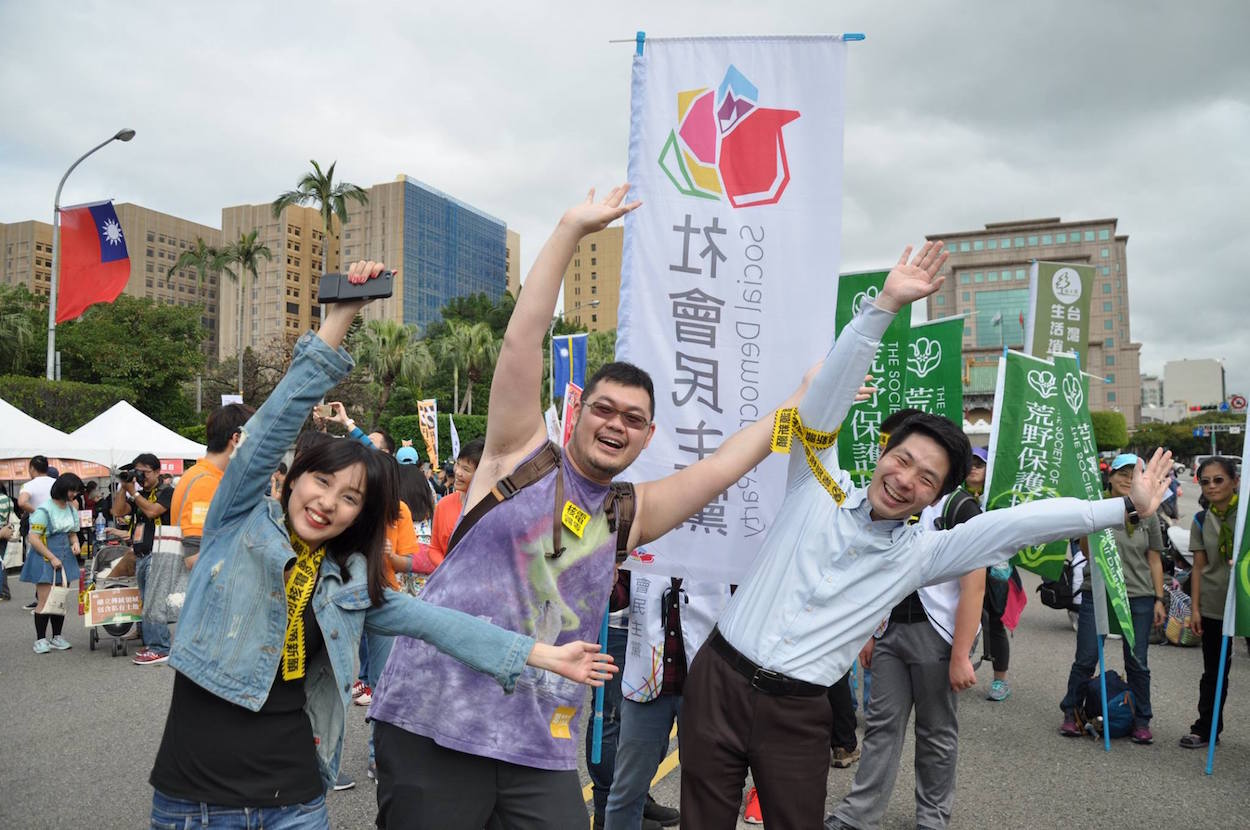 Photo credit: 陳又新 港湖日新又新/Facebook
Photo credit: 陳又新 港湖日新又新/Facebook
In reality, social democracy does not rule out the free market, it just believes that this needs to be changed, for the free market to become more equal. We don’t advocate Communism, which opposes the free market. We advocate what we do because of socioeconomic inequalities as a result of neoliberalism, and hope to find a more equal path to progress.
This is why the ideals of social democracy have been accepted by many people. But for Taiwan, Taiwan is used to how things are now. Taiwan hasn’t gone on a left-wing past before, so you will find that people are very concerned with the growth to the GDP and forget that, even if this grows, they will not get a cent. This is what we need to work on and what the SDP needs to push hard for.
BH: What do you think is different about elections compared to two years ago? Tsai Ing-Wen has been in power two years.
CY: Two years ago, the DPP rode into power, including being able to take the presidency and win many seats in the legislature. But from two years up until now, it has failed to live up to the expectations of the people. Whether this is with regards to the ruling by the Council of Grand Justices on marriage equality, which it has sat on and ignored, or other issues, such as opposition to nuclear energy or labor rights, during protests in which I was arrested myself. Whether with cutting seven public holidays or the yili yixiu policy, you will find that DPP policy is much like the KMT’s former policy. You will find then, that the biggest differences between the DPP and KMT are regarding the issue of independence versus unification, and that their political orientation is the same. They are both neoliberal, capitalist parties.
When the DPP government took power two years ago, I thought that this was a good thing. Many young people were reacting against capitalism and neoliberalism, and in voting for the DPP, but as it transpires, their political direction has proved to be the same.
If you hope for change in Taiwan, then you should vote for the SDP or similar small parties. You can see in the past that people said we were not connected to localities in the past, that we were too idealistic or intent on pushing for our views. But you can see now, that this wasn’t an effective method. Other parties or individuals will suddenly advocate one policy than another, such as supporting “One family on both sides of the straits,” or other political shifts with regards to what direction you want Taiwan to move in. As for us, we will remain steadfast in our platform from start to finish without wavering. Our political positions have been consistent. We hope to give voters a new choice.
BH: In closing, what else would you have to say to readers? Not only Taiwanese readers, but also international readers?
CY: I have to thank you for being willing to interview a small party such as ourselves. I have to say that during this period of time, Taiwanese media has primarily been interested in interviewing parties with a larger chance of victory and politicians that tend to attract more attention. It is easier for those who are more recognizable or who have more money to make their voices heard, but for those who are less recognizable, sometimes they resort to strange means to get attention, such as with Crazy Friday or something like that.
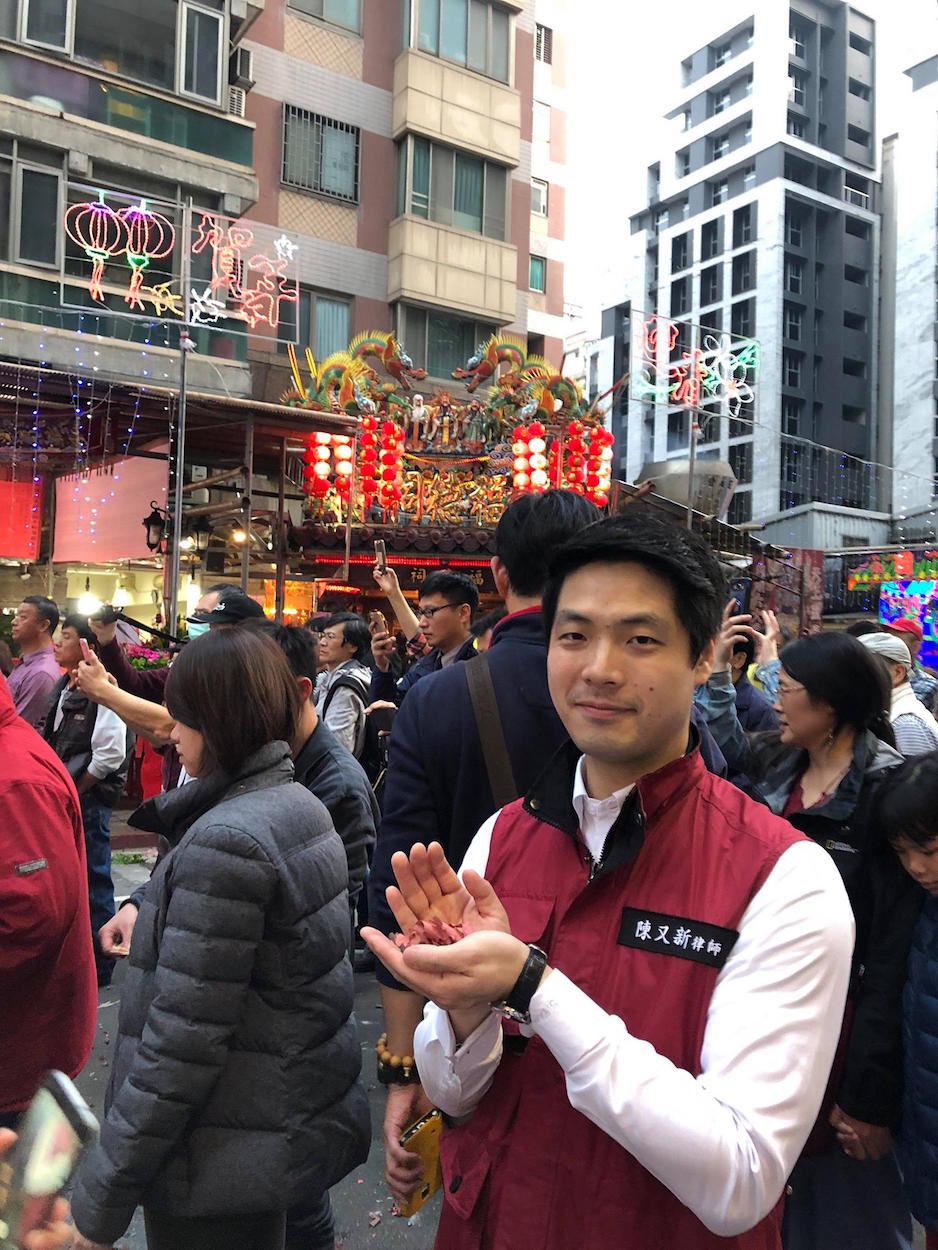 Photo credit: 陳又新 港湖日新又新/Facebook
Photo credit: 陳又新 港湖日新又新/Facebook
This is the challenge we face, and I hope readers can know this—particularly for New Bloom readers who may be more interested in reporting with substantive content and reports with direction and views of their own, rather than trite language without content. I hope more can read this kind of writing, that New Bloom can have more support, and more people can share this. This will be helpful to small parties such as ourselves and independent candidates, to allow us opportunities in the future.
It is because people continue to support this kind of media environment, that you see much reporting without content, and if you want to know more about topics in-depth, please continue to support this kind of media and to help them grow into established platforms. We ourselves do not hope to become politicians who are primarily known for humorous behavior but instead strive to actually become elected, and to change the political environment in Taiwan, so we hope for continued support from readers.

